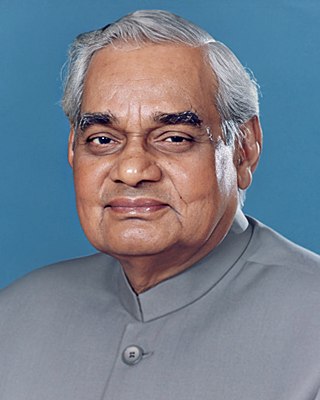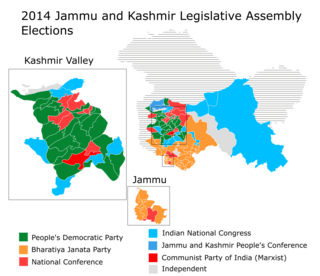Related Research Articles
A coalition government, or coalition cabinet, is a government by political parties that enter into a power-sharing arrangement of the executive. Coalition governments usually occur when no single party has achieved an absolute majority after an election. A party not having majority is common under proportional representation, but not in nations with majoritarian electoral systems.
Politics of India works within the framework of the country's Constitution. India is a parliamentary secular democratic republic in which the president of India is the head of state & first citizen of India and the Prime Minister of India is the head of government. It is based on the federal structure of government, although the word is not used in the Constitution itself. India follows the dual polity system, i.e. federal in nature, that consists of the central authority at the centre and states at the periphery. The Constitution defines the organizational powers and limitations of both central and state governments; it is well recognised, fluid and considered supreme, i.e. the laws of the nation must conform to it. India is officially declared a secular and socialist state as per the Constitution.

The Indian National Congress (INC), colloquially the Congress Party or simply the Congress, is a political party in India with deep roots in most regions of India. Founded on 28 December 1885, it was the first modern nationalist movement to emerge in the British Empire in Asia and Africa. From the late 19th century, and especially after 1920, under the leadership of Mahatma Gandhi, the Congress became the principal leader of the Indian independence movement. The Congress led India to independence from the United Kingdom, and significantly influenced other anti-colonial nationalist movements in the British Empire.

The Democratic Alliance (DA) is a South African political party which is a part of the current South African Government of National Unity (GNU). The party has been the second-largest in South Africa since its foundation in 2000. The party is broadly centrist, and has been attributed both centre-left and centre-right policies. It is a member of Liberal International and the Africa Liberal Network. The DA traces its roots to the founding of the anti-apartheid Progressive Party in 1959, with many mergers and name changes between that time and the present. The DA has a variety of ideologically liberal tendencies, including neoliberalism, social liberalism, classical liberalism, and conservative liberalism. The party draws its support predominantly from Afrikaans and English speakers, people aged over 35, and white South Africans, as well as the Indian and Coloured communities.

The Communist Party of India (Marxist) (abbreviated as CPI(M)) is a communist political party in India. It is the largest communist party in India in terms of membership and electoral seats, and one of the six national parties of India. The party was founded through a splitting from the Communist Party of India in 1964 and it quickly became the dominant faction.

The Communist Party of India (CPI) is the oldest communist party in India. The CPI was founded in modern-day Kanpur on 26 December 1925.

The Telugu Desam Party is an Indian regional political party primarily active in the states of Andhra Pradesh and Telangana. It was founded by Telugu matinée idol N. T. Rama Rao (NTR) on 29 March 1982 and has focused on supporting Telugu people. The party has won a five-time majority in the Andhra Pradesh Legislative Assembly and has emerged as the most successful political outfit in the state's history. It is currently the ruling party in the Andhra Pradesh Legislative Assembly.

The National Democratic Alliance is an Indian big tent multi-party political alliance, led by the country's biggest political party, the Bharatiya Janata Party (BJP). It was founded on 15 May 1998. It currently has a majority in both the Lok Sabha and the Rajya Sabha, and controls the Government of India as well as the governments of 19 out of 28 Indian states and one Union territory.

Janata Dal (United) ("People's Party (United)"), abbreviated as JD(U), is a social-democratic and secularist Indian political party, rooted mainly in eastern and north-eastern India, whose stated goals are promoting social justice and lifting up marginalised people. JD(U) is recognised as a state party in the states of Bihar, where it heads the government, Manipur, where it is part of the government coalition in the legislative assembly, and Arunachal Pradesh. JD(U), as part of the Bharatiya Janata Party-led National Democratic Alliance, won 12 seats in the 2024 Indian general election, making it the seventh largest party in the Lok Sabha.

General elections were held in India in four phases between 20 April and 10 May 2004. Over 670 million people were eligible to vote, electing 543 members of the 14th Lok Sabha. Seven states also held assembly elections to elect state governments. They were the first elections fully carried out with electronic voting machines.

Pattali Makkal Katchi is a party in Tamil Nadu, India, founded by S. Ramadoss in 1989 for the Vanniyar caste in northern Tamil Nadu. It is a part of the BJP-led National Democratic Alliance (NDA). It contests the elections with the "Ripe Mango" symbol.
The United Progressive Alliance was a political alliance in India led by the Indian National Congress. It was formed after the 2004 general election with support from left-leaning political parties when no single party got the majority.

The Naga People's Front (NPF) is a regional political party in Nagaland, Manipur and Arunachal Pradesh. It headed the Nagaland government with the Bharatiya Janata Party, as part of the Democratic Alliance of Nagaland from 2003 to 2018. NPF is coalition partner of N. Biren Singh ministry led BJP government in Manipur. The party ideology includes Conservative Christianity, thus encouraging it. It demands and supports greater autonomy for Naga areas and Naga cultural Nationalism.

The Jammu and Kashmir Peoples Democratic Party (PDP) is a state political party in Jammu and Kashmir, India. The PDP was headed and founded by Mufti Mohammed Sayeed. His daughter, Mehbooba Mufti, succeeded him as party leader and as chief minister of Jammu and Kashmir following his death in January 2016. The party is a member of the People's Alliance for Gupkar Declaration electoral alliance. The party is also a member of the Indian National Developmental Inclusive Alliance since its founding on 18 June 2023.

The United Democratic Front (UDF) is the Indian National Congress-led alliance of centre to centre-right political parties in the Indian state of Kerala. It is one of the two major political alliances in Kerala, the other being Communist Party of India (Marxist)-led Left Democratic Front, each of which has been in power alternately since 1980 E. K. Nayanar ministry. Most of the United Democratic Front constituents are members of the Indian National Congress-led Indian National Developmental Inclusive Alliance at pan-India level.

General elections were held in India between 5 September and 3 October 1999, a few months after the Kargil War. Results were announced on 6 October 1999.

Panchayat was a political system in Nepal from 1961 to 1990. It banned political parties and placed all governmental power, including power over the Council of Ministers and Federal Parliament, under the sole authority of the king; this made the country a de facto absolute monarchy.

The 2014 Jammu and Kashmir Legislative Assembly election was held in the Indian state of Jammu and Kashmir in five phases from 25 November – 20 December 2014. Voters elected 87 members to the Jammu and Kashmir Legislative Assembly, which ends its six-year term on 19 January 2020. The results were declared on 23 December 2014. Voter-verified paper audit trail (VVPAT) along with EVMs were used in 3 assembly seats out of 87 in Jammu Kashmir elections.
Mahagathbandhan, also known as Grand Alliance, is a coalition of political parties in the Eastern state of Bihar in India, formed ahead of the 2015 Vidhan Sabha elections in Bihar. The alliance consists of Rashtriya Janata Dal (RJD), Indian National Congress (INC) and Left parties including Communist Party of India (CPI), Communist Party of India (Marxist–Leninist) Liberation-CPIML (Liberation) and Communist Party of India (Marxist) (CPIM), with Tejashwi Yadav as the chairperson.

Legislative Assembly elections were held in the Indian state of West Bengal in 1971. The assembly election was held alongside the 1971 Indian general election.
References
- 1 2 Kala, Chhabi (18 July 2023). "Explained: What is Common Minimum Programme, the common ground Opposition seeks ahead of 2024?". The Financial Express . Retrieved 20 May 2024.
- ↑ "India's 'common minimum programme'". BBC. 28 May 2004. Retrieved 20 January 2025.
- ↑ Singh, Rishi (19 June 2009). "Common Minimum Programme Hoodwinking the people again?". The Himalayan Times . Retrieved 20 May 2024.